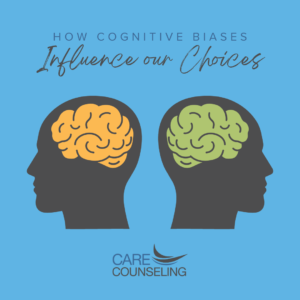How Cognitive Biases Influence Our Choices

Every day, we make countless decisions, from the mundane to the life-altering. However, the human mind is not a perfectly rational decision-making machine. Our choices are often influenced by cognitive biases, subconscious patterns of thinking that can lead us astray. In this blog post, we will explore the psychology of decision-making, the impact of cognitive biases on our choices, and how awareness of these biases can lead to better decision-making.
- Understanding Decision-Making in the Human Mind
Decision-making is a complex mental process that involves gathering information, evaluating options, and choosing the most suitable course of action. The human brain employs heuristics, and mental shortcuts, to simplify decision-making processes and conserve cognitive energy.
- Cognitive Biases: Unconscious Influences on Decision Making
Cognitive biases are mental shortcuts that, while helpful in some situations, can lead to systematic errors in judgment and decision-making. These biases are often subconscious, shaping our perceptions, beliefs, and choices without us being aware of their influence.
- Common Cognitive Biases and Their Effects
- Confirmation Bias: The tendency to seek and interpret information that confirms our existing beliefs, while dismissing contradictory evidence. This bias can lead to selective exposure, confirmation, and self-fulfilling prophecies.
- Availability Heuristic: Relying on readily available information in memory when making decisions, often leading to overestimating the likelihood of easily recalled events.
- Anchoring Bias: The tendency to rely heavily on the first piece of information encountered when making decisions, which can anchor our subsequent judgments.
- Sunk Cost Fallacy: Persisting with a decision or course of action due to the resources already invested, rather than evaluating the current circumstances objectively.
- Overconfidence Bias: Overestimating our abilities and the accuracy of our judgments, leading to riskier decisions.
- Bandwagon Effect: The inclination to adopt beliefs or follow behaviors because many others do, without critical evaluation.
- Loss Aversion: Placing a higher value on avoiding losses than gaining equivalent rewards, which can lead to risk aversion.
- The Impact of Cognitive Biases on Important Decisions
Cognitive biases can significantly impact important life decisions, such as financial investments, career choices, and relationships. They can hinder objectivity and lead to suboptimal outcomes.
- Developing Decision-Making Awareness
- Recognize Cognitive Biases: Be aware of common cognitive biases and how they may influence your decisions. This awareness allows you to be more mindful of potential biases in your thought process.
- Take Time for Reflection: Avoid making decisions hastily. Take time to reflect, gather information, and consider alternatives before making a choice.
- Seek Diverse Perspectives: Gather input from others with different viewpoints to challenge your own assumptions and reduce the risk of biases.
- Question Your Assumptions: Regularly question your beliefs and assumptions to avoid falling into confirmation bias.
- Embrace Uncertainty: Acknowledge that some decisions involve uncertainty and that outcomes cannot always be predicted with absolute certainty.
- Balancing Intuition and Deliberation
While cognitive biases can lead to errors, intuition can be an asset in decision-making. Learning to balance intuition with deliberate, rational thinking allows for more comprehensive and informed choices.
The psychology of decision-making reveals the complex interplay of rationality and cognitive biases that influence our choices. Cognitive biases, although often subconscious, can lead us astray and impact important life decisions. By recognizing these biases and developing decision-making awareness, we can make more thoughtful and objective choices.
Striving to be mindful of cognitive biases, seeking diverse perspectives, and taking time for reflection can help mitigate the influence of biases on our decisions. Remember that decision-making is a skill that can be honed over time, and embracing uncertainty and a balance between intuition and deliberate thinking can lead to better outcomes.
As we navigate the intricacies of decision-making, let us remain curious and open to learning, using our understanding of cognitive biases as a tool to enhance the quality of our choices and lead more fulfilling lives.



























